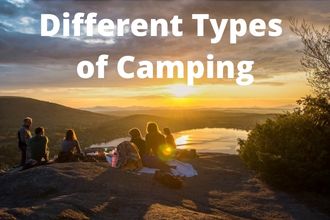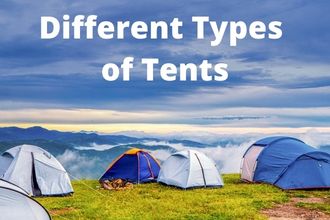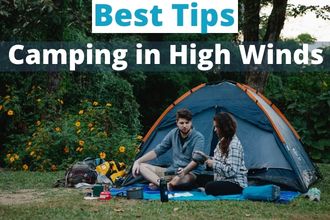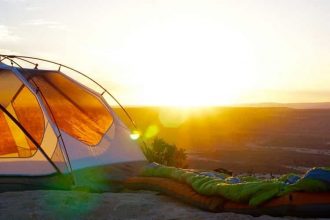Tent camping is one of the best experiences for an outdoorsman. Usually, sleeping in tents is safe, but there are some risks to sleeping outdoors as snakes or insects may enter there anytime.
So, the question arises, can a snake bite through a tent? In general, snakes don’t bite through tents. But, snakes may get into tents and bite campers if they get scared or find any food source inside tents. However, there are ways to keep snakes away from tents and make the tents snake-proof.
This article will discuss the risks of entering snakes in the tent and some handy tips to stop snakes from entering the tent and biting you. Keep scrolling!
Can Snakes Get In Tents?
Humans get scared if they see snakes. But do you know snakes are more afraid than you? These serpents aren’t very aggressive and don’t attack until they get provoked.
Normally, snakes don’t get in the tents if they know there are humans or predators. Let’s know the reasons why snakes may enter the tent.
- On hot days these reptiles can go on tents for shade to cool down as they’re cold-blooded.
- If snakes find the tent empty, there is a high chance that they will enter there to protect themselves from predators. Or they can hide in the sleeping bag.
- Sometimes snakes may hide under the tent as a safe den. If you forget to unzip the door and windows of the tent and don’t use any footprints, snakes may enter the tent.
- If there is any food source inside the tent, snakes may get in there for the food.
Read Also: Can you camp without a tent?
Can A Snake Bite Through A Tent?
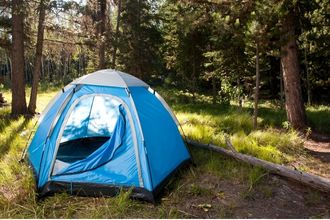
It is also important to note that snakes do not typically bite through tents to attack humans. Most snakes will retreat or avoid contact with humans if given the opportunity. In the rare event that a snake does bite through a tent, it is more likely that the snake was startled or felt threatened.
When snakes come very close to the tents, they try to get in there first. If they are unable to enter the tent fabric, in this case, they can bite you through the tent.
They just bite the campers but don’t fang-like dogs or cats. Snakes have long, flexible jaws that allow them to open their mouths wide and swallow prey whole.
Their fangs, located in the front of their upper jaw, are designed for injecting venom into their prey. The fangs are typically sharp and pointed, but they are not strong enough to puncture through most materials.
Things that determine whether the snakes bite or not through tents.
- When it comes close to tents, the material and thickness of the tent will play a significant role in determining whether or not a snake can bite through it. Tents are made from thick and sturdy materials, such as nylon or canvas.
These materials will provide better protection against snake bites than thinner and more lightweight materials like polyester. Additionally, tents with a double-wall construction will provide an extra layer of protection, as snakes will have to bite through two layers of material.
- Another factor to consider is the size and species of the snake. Some snakes, such as the venomous coral snake, have smaller mouths and fangs, making it less likely for them to bite through a tent. On the other hand, larger snakes, such as the python, have much larger mouths and fangs and may be able to bite through a tent.
Read Also: Know different types of camping
Statistics On Snakes Bite To Campers
According to the Center for Disease Control (CDC), every year more than 40 million people go on camping in the USA. Out there 7000 to 8000 people have encountered snake bit and 5 of them died each year, that’s a small percentage.
Kyle Dickman, an avid outdoorsman, and a camper was on a hiking trip at Yosemite with his family, suddenly a rattlesnake bit him. The sound was scary and he got treatment after several hours. Dickman almost lost his leg there then.
An old man was camping in Missouri in 2012 while celebrating his 50th anniversary with family members. But he died after getting bitten by a copperhead snake. Unfortunately, a snake entered the tent and the man was bitten by the snake when he tried to keep it out. The man dies several days later due to the snake bite.
It’s really frightening to get snakes in the tent. So, it’s important to know the hacks to keep snakes away from the tent and campsites.
How To Keep Snakes Away From Tents?
Snakes are a common sight in many outdoor camping locations, and while they may be fascinating to observe, they can also pose a threat to campers. Here are some tips on how to keep snakes away from your tent while camping.
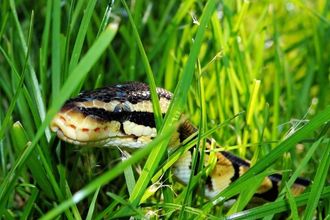
1. Choose The Right Campsite
Snakes are more likely to be found in shady areas, such as tall grass or brush. When selecting a campsite, look for open, clear areas that are less likely to attract snakes.
Read Also: Tips to secure the tent in windy areas
2. Set Up Camp Away From Known Snake Habitats
Snakes are often found near water sources, such as streams or ponds, as well as rocky outcroppings or wooded areas. Try to set up your tent in an area that is farther away from these types of habitats.
3. Keep The Campsite Clean
Snakes are attracted to the smell of food, so be sure to keep your campsite clean and free of food scraps. Store all food and trash in bear-proof containers or hang them from a tree.
Read Also: Machetes could help you clenaning the campsite
4. Use Snake-Proof Tent
Some tents are designed with snake-proof features, such as built-in groundsheets or mesh walls. These types of tents can help to keep snakes out of your sleeping area.
5. Use Snake-Proof Barrier
You can use a snake-proof barrier around your tent to keep snakes away. This can be as simple as a ring of salt or a line of crushed eggshells around the perimeter of your tent. If there is any hole in the tent repairs it so snakes can’t enter from there.
6. Use Snake-Repellent
Some snake repellents are made with natural ingredients, such as sulfur or cedar oil, which can help to keep snakes away from your campsite. Naphthalene and garlic can also be used to repel snakes naturally. If you want you can also purchase and use snake-repellent spray.
7. Smoke
Smoke is another proven way to keep snakes away from the campsite. If there is a fire pit in the campsite, snakes will get scared and go away from there.
8. Predators
Snakes scare predators’ sound. If you camp with dogs, you have the weapon at hand. So, the smell and sound of dogs will help to keep snakes away.
9. Noise
Noise is a great way to stop snakes to come near the tent. Predators like cats or dogs will do the job here. You can also buy a device to make sound continuously.
By following these tips, you can keep snakes away from your tent and enjoy a safe and comfortable camping experience. Remember always to be cautious and aware of your surroundings and if you do encounter a snake, do not try to handle it, call a professional instead.
Read Also: Tent with built-in lights
Is There Any Snake-Proof Tent?
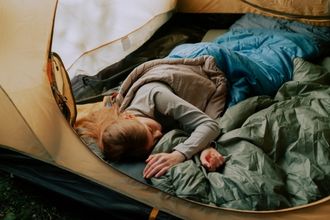
There is no such thing as a completely snake-proof tent, as no material or design can guarantee 100% protection against a snake bite. However, there are certain tents that offer a higher level of protection against snake bites than others.
- Tents made from thicker and more durable materials, such as nylon or canvas, will provide better protection against snake bites than thinner and more lightweight materials like polyester. Additionally, tents with a double-wall construction will provide an extra layer of protection, as snakes will have to bite through two layers of material.
- Another option is to use a “bug net” tent, which is designed to keep insects and other small animals out. These tents typically have a mesh layer that covers the entire tent, providing an additional barrier against snakes.
- It’s also important to note that the best way to avoid snake bites is to properly set up your tent in safe places and to be aware of your surroundings. Snakes will typically retreat or avoid contact with humans if given the opportunity, so it’s crucial to avoid camping near known snake habitats such as near wetlands, rocky areas, or tall grass.
Extra Tips to Avoid Tent Snakes
Now, I’ll share a few more tips on how to keep snakes away when sleeping on the ground.
- Choose a snake-free camping location
- Repair tent holes and openings
- Unzip doors and windows
- Check the tent before getting in
- Keep food out of the tent
- If you’re sure there are snakes, wear snake-resistant clothing
Read Also: Summer camp packing list
People Also Ask
Q: What is the best area for a snake-free campsite?
Answer: The best area for a snake-free campsite would be one that is far away from known snake habitats and does not provide suitable conditions for them to thrive. Some examples of such areas may include high-altitude areas, sandy or rocky terrain, urban or developed areas, deserts, coastal areas
Q: How do I treat a snakebite?
Answer: If the snake is venomous, the bitten person may need antivenom treatment. As first aid tie the above wound well so the venom can’t reach the heart. You can also clean the bitten place with soap and water. And seek medical assistance as soon as possible.
Final Thoughts
While a snake can potentially bite through a tent, it is unlikely. The material and thickness of the tent, the size and species of the snake, and several other reasons determine whether the snake can bite through the tent or not.
It is important to take precautions when camping, such as choosing a good camp spot, using a thicker and more durable tent, etc. And when camping goes with your dogs and pack snake and insect repellent so you can enjoy safe camping in the wilderness.

Joe is the founder and chief editor of PickOutdoorGear. He loves hiking, camping, fishing, hunting, and other outdoor activities. He will share his knowledge and experience here that he learned and still learning from the wilderness.

